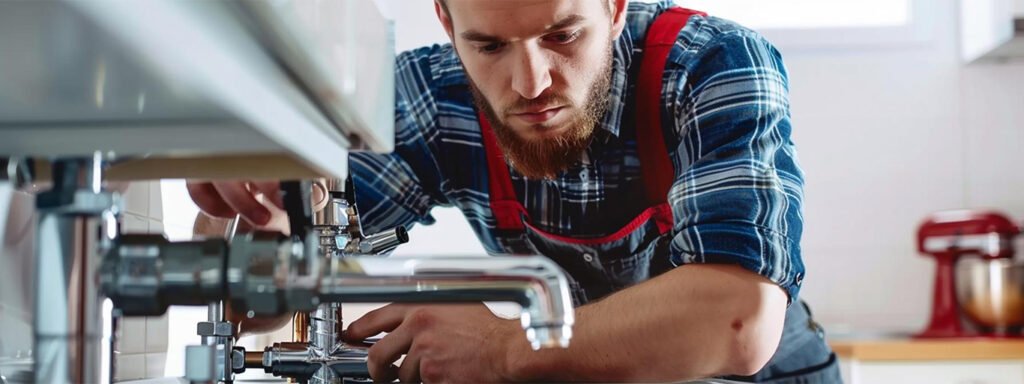Plumbing issues can range from minor annoyances to serious emergencies that threaten your home’s integrity and your family’s safety. Understanding what constitutes a plumbing emergency is crucial for timely intervention and preventing extensive damage.
According to industry experts, burst pipes, sewage backups, and gas leaks are among the most critical plumbing emergencies that require immediate attention. Recognising these situations promptly can save you from costly repairs and health hazards.
What Is Considered a Plumbing Emergency?
A plumbing emergency involves any issue that poses an immediate threat to your home, health, or safety and demands urgent attention from a licensed plumber. These problems typically include water leaks, blocked drains, gas leaks, burst pipes, and sewage system failures. What sets these situations apart from regular plumbing issues is the level of damage they can cause in a short time if not handled promptly.
A plumbing emergency is any sudden issue in your plumbing system that risks property damage, safety hazards, or severe water loss. Examples include burst pipes, blocked sewer lines, and gas leaks. These emergencies require immediate plumber services to prevent extensive damage or health risks. Acting fast can save thousands in repairs and protect your home from long-term consequences.
Common Signs of a Plumbing Emergency
Recognising the early warning signs of a plumbing emergency can prevent disaster. While some issues seem minor, they often signal a much larger problem developing behind the scenes. Here are key indicators that it’s time to call plumber services immediately:
- Sudden Drop in Water Pressure: A significant or sudden loss in water pressure could point to a burst pipe or a serious leak in the system.
- No Water at All: Complete water loss often signals a major failure in the main water line or a blocked supply.
- Water Backing Up: Sewer or drain water backing up into your sink, toilet, or tub can indicate a major clog or a collapsed sewer line—often a health hazard.
- Water Stains on Walls or Ceilings: These may signal a hidden leak that’s soaking into the structure, which could weaken ceilings or promote mould growth.
- Unusual Noises: Gurgling, whistling, or banging noises in your pipes can mean trapped air, high water pressure, or an impending pipe failure.
- Smell of Gas or Sewage: If you smell gas or a strong sewage odour, leave the property immediately and call emergency plumbing services.
Common signs of a plumbing emergency include burst pipes, water leaks, blocked drains, sewer backups, loss of water, or the smell of gas or sewage. These issues typically require immediate plumber services to prevent property damage or health hazards. Acting quickly can stop the problem from escalating.
When to Call Emergency Plumber Services
Not every plumbing issue requires a 3am callout, but some situations demand fast action to prevent lasting damage or danger. Here’s when it’s absolutely necessary to contact emergency plumber services:
- Burst Pipes: Water can gush out rapidly, flooding your home and damaging floors, walls, and belongings. Immediate professional help is essential to stop the water and repair the pipe.
- Overflowing Toilets: If your toilet is overflowing and you can’t stop the flow, especially if it’s caused by a sewer backup, it poses a health risk and needs urgent attention.
- Gas Leaks: A sulphur or rotten egg smell near gas lines or hot water systems is a clear sign of a leak. Don’t try to fix it yourself—get out and call for emergency help.
- Sewage Smells or Backups: Raw sewage is both a health risk and a sign of a serious plumbing failure. Don’t wait—this is a job for professionals with proper gear.
- Major Water Leaks: If you can’t isolate or stop a water leak with the main valve, emergency plumbing is your only option to avoid serious damage.
Call emergency plumber services when facing burst pipes, gas leaks, sewer backups, or uncontrollable leaks. These issues pose immediate safety risks or property damage and require urgent professional help. Delaying could increase the cost and complexity of repairs.
Risks of Ignoring a Plumbing Emergency
Delaying action during a plumbing emergency isn’t just a gamble—it can cost you thousands and endanger your home. The risks multiply quickly, especially when water or gas is involved.
- Structural Damage: Water from a burst pipe or severe leak can weaken timber, plaster, and concrete. Left unchecked, it can rot foundations, cause ceilings to sag, and walls to crumble.
- Health Hazards: Sewage backups and mould from persistent leaks can lead to serious respiratory issues, especially in children, the elderly, and people with allergies or asthma.
- Electrical Risks: Water and electricity are a deadly mix. A hidden leak near electrical wiring can create fire risks or cause short circuits.
- Higher Repair Costs: The longer a problem continues, the more complex and expensive it becomes to repair—especially if water spreads into unseen areas.
- Legal and Insurance Issues: In rental properties or shared buildings, failing to act on emergencies might breach tenancy laws or void your insurance coverage.
Ignoring a plumbing emergency can cause severe water damage, health issues from mould or sewage, and electrical hazards. It can also lead to higher repair costs and legal complications. Quick action limits damage and ensures safety.
What to Do Before the Plumber Arrives
Taking a few quick steps before your emergency plumber arrives can prevent additional damage and make the repair process smoother. Here’s a practical checklist to follow:
- Shut Off the Water Supply: Find your home’s main shut-off valve (usually near the meter or outside tap) and turn it off immediately to stop further water flow.
- Turn Off Gas Supply: If you suspect a gas leak, switch off the gas at the meter and evacuate the premises.
- Unplug Electrical Devices Nearby: If water is leaking near power points or appliances, turn off electricity at the mains to avoid electrical hazards.
- Clear the Area: Move furniture, rugs, or valuables away from the affected area to reduce damage.
- Contain the Water: Use buckets, towels, or mops to stop water from spreading further, especially if it’s leaking from ceilings or floors.
- Avoid DIY Fixes: Trying to patch pipes or dismantle plumbing systems without proper tools can worsen the situation.
Before your emergency plumber arrives, shut off the water or gas supply, unplug nearby devices, and move valuables away. Avoid DIY fixes and try to contain leaks with towels or buckets. These steps minimise further damage until help arrives.
How to Prevent Future Plumbing Emergencies
While you can’t avoid every emergency, many issues are preventable with basic care and regular maintenance. Here’s how homeowners can reduce their risk of plumbing disasters:
- Schedule Regular Inspections: Get a licensed plumber to inspect your pipes, drains, and hot water systems at least once a year. Early detection is key to preventing major faults.
- Clear Drains Responsibly: Don’t pour grease, food scraps, or non-biodegradable items down the sink. Install strainers to catch debris in bathroom and kitchen drains.
- Monitor Water Pressure: High water pressure puts stress on your pipes. If your taps seem too powerful or noisy, get your pressure checked and adjusted.
- Know Where Shut-Off Valves Are: Everyone in the house should know where the water and gas shut-off points are. That knowledge can prevent chaos during an emergency.
- Replace Old Plumbing: Pipes that are more than 20–30 years old are more likely to burst or leak. Consider upgrading them if your home is ageing.
Prevent plumbing emergencies by scheduling regular inspections, avoiding drain misuse, monitoring water pressure, and replacing old pipes. Knowing where shut-off valves are can also reduce damage during emergencies. Proactive care helps avoid costly surprises.
Choosing the Right Plumber Services in an Emergency
Not all plumbers are equipped—or even willing—to handle emergencies. Choosing the right provider can make all the difference between a quick fix and a drawn-out, expensive disaster. Here’s what to look for:
- 24/7 Availability: Emergencies don’t follow business hours. Choose a plumber who offers round-the-clock services, including weekends and holidays.
- Licensed and Insured: Always verify that the plumber is fully licensed and insured to work in your area. This protects you legally and ensures they meet safety standards.
- Transparent Pricing: A reputable emergency plumber will provide upfront pricing or estimates, even in urgent situations, so there are no surprises later.
- Fast Response Time: Speed matters. Look for local plumber services that can arrive quickly—especially if you’re dealing with water or gas issues.
- Customer Reviews and Reputation: Check online reviews or ask for referrals. Consistently high ratings are a good indicator of reliability, especially in high-stress situations.
In a plumbing emergency, choose licensed and insured plumber services that offer 24/7 availability, fast response times, and transparent pricing. Reliable professionals prevent further damage and ensure safe, effective repairs.



